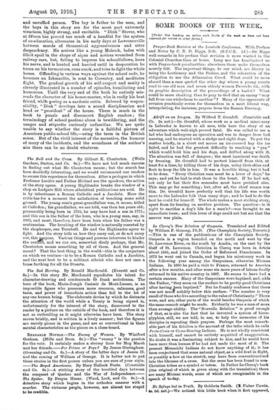The Bali and the Cross. By Gilbert K. Chesterton. (Wells
Gardner, Darton, and Co. 6s.)—We have not had much success in finding out what Mr. Chesterton means ; but the search has been decidedly interesting, and we would recommend our readers to secure this experience for themselves. After a prologue in which Professor Lucifer and Father Michael are the speakers, the action of the story opens. A young Highlander breaks the window of a shop on Ludgate Hill where atheistical publications are sold. He is by inheritance a Roman Catholic and a Jacobite. Here the critic has for a moment the satisfaction of touching some solid ground. The young man's great-grandfather was, it seems, killed at Culloden ; his grandfather, we are told, was then ten years old; presumably being born in 1735, he may have had a son in 1775 ; and this son is the father of the hero, who is a young man, say, in 1905, and must, therefore, have been born when his father was a centenarian. The breaking of the window is naturally resented by the shopkeeper, one Turnbull. He and the Highlander agree to fight. And the story tells us how they carry out, or do not carry out, thiswrpose. Various things and persons intervene to hinder the c,onfra, ana we can see, somewhat dimly perhaps, that Mr. Chesterton means something by all of them. And the general moral? That the best thing in the world—this is the conjecture on which we venture—is to be a Roman Catholic and a Jacobite, and the next best to be a militant atheist who does not care a brass farthing for all the Stuarts.






































 Previous page
Previous page